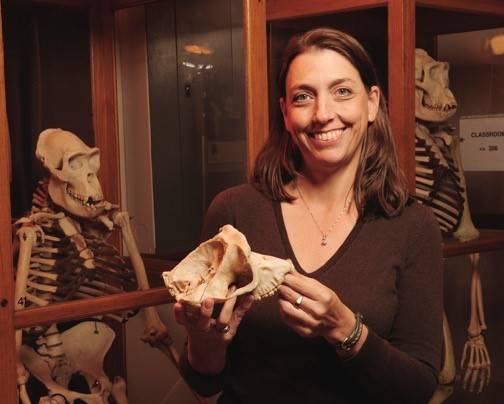NSF grant funds study of savanna chimpanzees' unique use of tools to hunt
Jayme Blaschke | September 8, 2020

Jill Pruetz, a professor in the Department of Anthropology at Texas State University, has received a National Science Foundation grant to study a group of chimpanzees that hunt with the aid of tools.
The three-year, $83,000 grant from the NSF Division of Behavioral and Cognitive Science will support "Collaborative Research: The Ecological Basis of Hunting and Meat Sharing in Female Savanna Chimpanzees." More information may be found at www.nsf.gov/awardsearch/showAward?AWD_ID=2022310.
"One of the unique features about the chimps that I study is that, not only do they hunt, they are the only chimpanzee population recorded to date to systematically hunt with tools," Pruetz said. "They use stick tools to hunt galago primates—bush babies—which are nocturnal and sleep in tree cavities during the day. Chimpanzees make modified stick tools and jab at them in these tree branch and trunk cavities to try and get the galagos to jump out, so they can grab them, or to try and injure them so they can reach in and grab them.
"The other unique feature is that it is the female chimpanzees, not the males, that exhibit this tool-assisted hunting more frequently," she said. "At other sites where chimps have been studied, it is males that do the hunting. Anthropologists have always been interested in the fact that chimpanzees hunt and share meat because it's something we think helped define our own lineage in evolutionary history."
Hunting with tools may enable female chimpanzees to routinely ingest and share meat on a seasonal basis without the need for being provisioned by males. The research will study the dietary impacts of female chimpanzee hunting with tools and compare these findings with other studies that have focused primarily on male chimpanzee hunting behaviors. The findings from this project are expected to advance knowledge and broaden perspectives about primate models for understanding human behavioral evolution.
"The fact that the chimps I study live in a savanna habitat and not in forests is one of the reasons we see the tool-assisted hunting," Pruetz said. "The chimps at my Fongoli field site don't have access to the forest monkeys (Colobus monkeys) that are the favored prey species of chimpanzees that live in forests."
While there is a well-documented understanding of these behaviors in forest chimpanzees, a significant gap exists on how chimpanzees hunt and eat meat in savannas. What little is known about hunting and meat-eating in savanna chimpanzees, however, starkly contrasts with the typical species pattern. In the hottest, driest, and most open landscapes inhabited by chimpanzees, tool use and female-biased hunting comprise a major component of hunting strategy. This study will test for environmental pressures that may explain this behavior.
The research is part of a long-term program that supports habitat preservation in protected and unprotected areas for the critically-endangered western chimpanzee.
Share this article
For more information, contact University Communications:Jayme Blaschke, 512-245-2555 Sandy Pantlik, 512-245-2922 |